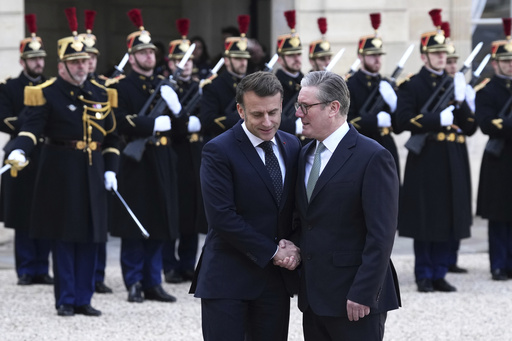
PARIS — On Monday, European leaders emphasized their desire to be included in international discussions aimed at resolving the conflict in Ukraine. Despite clear signals from Washington and Moscow suggesting that Europe currently has no role in negotiations, leaders from Germany, the United Kingdom, Italy, Poland, Spain, the Netherlands, Denmark, NATO, and the European Union engaged in three hours of emergency discussions at the Elysee Palace in Paris. The meeting highlighted a lack of consensus regarding potential peacekeeping forces, particularly after a flurry of U.S. diplomatic initiatives regarding Ukraine had strained the once unified trans-Atlantic alliance.
U.K. Prime Minister Keir Starmer urged for U.S. support while expressing readiness to deploy British troops alongside other forces in Ukraine if a sustainable peace agreement could be achieved. However, a divide emerged among EU countries, with nations like Poland expressing reluctance to send their military personnel into Ukraine. French President Emmanuel Macron remained non-committal on the issue, indicating a cautious stance.
Macron disclosed that he had had discussions with U.S. President Donald Trump and Ukrainian President Volodymyr Zelenskyy following the meeting. He stressed the goal of achieving a “strong and lasting peace in Ukraine,” reiterating that Russia must cease its aggression and that credible security guarantees are essential for Ukraine’s safety. He further noted that collaboration with European allies, the U.S., and Ukraine would be vital in pursuit of this objective.
Dutch Prime Minister Dick Schoof acknowledged the need for a unified European position regarding contributions to the peace process, stating that merely attending negotiations without meaningful input would be ineffective. Starmer remarked on the importance of the trans-Atlantic relationship, asserting that U.S. security assurances are essential for deterring future Russian aggression.
The recent visit by high-ranking U.S. officials from the Trump administration in Europe left some leaders concerned. General Keith Kellogg, special envoy for Ukraine and Russia, expressed skepticism regarding a multi-party approach to negotiations, advocating for a streamlined process. His sentiments were echoed by Russian Foreign Minister Sergei Lavrov, who downplayed Europe’s potential role in the talks.
Vice President JD Vance and Defense Secretary Pete Hegseth raised concerns about both European security commitments and democratic principles in a series of speeches last week. Macron responded to these criticisms, describing the rebukes from U.S. officials as a jolt to the system that undermined years of established policy, particularly following Trump’s decision to engage in dialogue with Russian President Vladimir Putin.
Just prior to the Paris meeting, Macron held a brief conversation with Trump, although details regarding their dialogue were not disclosed. Starmer is set to meet with Trump next week to discuss critical elements required for a durable peace in Ukraine, positioning himself as a potential mediator between the White House and Europe amidst evolving geopolitical dynamics.
German Chancellor Olaf Scholz stressed that any agreement with Russia must not be imposed on Ukraine, insisting that peace cannot simply be dictated. Similarly, Spanish Prime Minister Pedro Sánchez emphasized the importance of active EU and Ukrainian involvement in any peace negotiations to avoid repeating historical mistakes where aggressors were unfairly rewarded.
While the U.S. role remains crucial for the time being, with many European nations facing substantial hurdles in enhancing their defense capabilities, the current status of troop deployments remains contentious. Scholz characterized discussions of ground troops as premature and inappropriate, further complicating Europe’s military posture. Despite increasing defense budgets, the path to achieving specific spending goals remains uncertain. Poland’s Prime Minister Donald Tusk underscored a collective agreement on the necessity of enhancing defense expenditures, as Poland leads NATO members by allocating over 4% of its GDP for defense.

